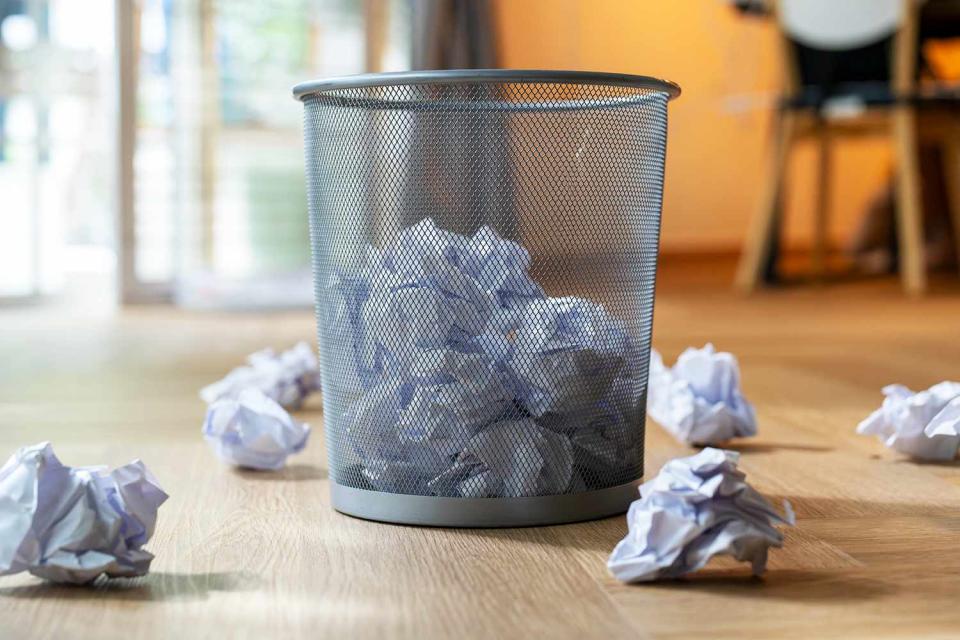Why Writing Down Angry Thoughts and Shredding Them May Help You Process Emotions in a Healthy Way
A new study in Japan found that the physical disposal of the paper itself played a key role in eliminating the anger

Witthaya Prasongsin/Getty
A stock image of crumbled-up paperManaging your anger could be as simple as putting pen to paper — followed by one extra key step — according to a new study.
In the findings, published on April 9 in Nature's Scientific Reports, researchers in Japan found that writing down your thoughts and feelings after a negative incident on a piece of paper and then shredding it or crumbling it into a ball and throwing it out in a trash bin can dispel anger. Specifically, it was the act of disposing of the paper — rather than just writing down feelings — that eliminated anger in the study participants.
"This study shows that physical disposal of a piece of paper containing one’s written thoughts on the cause of a provocative event neutralizes anger, while holding the paper did not," the study's authors, Yuta Kanaya and Nobuyuki Kawai, wrote.
Related: Night Shifts, Hectic Work Schedules When Young Can Lead to Depression, Poor Health in Middle Age
To conduct the study, a group of 57 students from a local university were asked to write brief opinions about an important social problem, such as smoking in public. Their handwritten responses were deliberately given low evaluations (according to criteria such as intelligence, rationality, logic and friendliness) and even some insulting comments.
The provoked participants then wrote down their angry thoughts about the negative feedback they received. One group of participants disposed of their paper in either the trash can or the shredder, while the other group kept their paper in a file or a plastic box on their desk.

Virojt Changyencham/Getty
A stock image of a person writing on paperNever miss a story — sign up for PEOPLE's free daily newsletter to stay up-to-date on the best of what PEOPLE has to offer, from celebrity news to compelling human interest stories.
While all of the participants demonstrated an increased subjective rating of anger in response to the negative feedback, those who discarded their paper in the trash can or shredded it returned to their baseline state. However, those people who retained their paper experienced only a small reduction in their overall anger.
"The meaning (interpretation) of disposal plays a critical role," the researchers concluded. "These results are consistent with other studies which showed that the meaning of disposal was critical for determining its impact, not the action itself."
The study's authors noted that the results may be connected to the phenomenon of "backward magical contagion," which is "the belief that actions taken on an object (e.g. hair) associated with an individual can affect the individuals themselves."
Related: Microplastics Found in Brain After Only 4 Weeks of Exposure
"The phenomenon of ‘magical contagion’ or ‘celebrity contagion’ refers to the belief that the ‘essence’ of an individual can be transferred to their possessions," they continued. "This backward magical contagion operates in a reversed process, where manipulating an object associated with a person is thought to impact the individuals themselves."
The elimination of anger through the disposal of an object may be achieved by recognizing that the physical entity — in this case, the piece of paper — has been diminished, causing the anger to also disappear.
Kanaya and Kawai noted that the study reveals a "convenient" and "cost-effective" way to manage anger in a variety of settings, including childcare, business meetings and clinical applications.
"The building blocks of this method (e.g. applying it to a digital device or creating a specific application) could be useful in various daily situations as well as behavioral therapies. In particular, for someone who has difficulty suppressing their anger in their homes," they wrote.
For more People news, make sure to sign up for our newsletter!
Read the original article on People.


